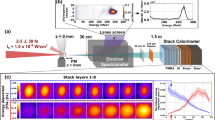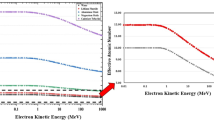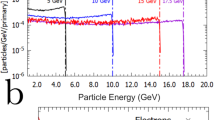Abstract
FIG. 1 gives a survey of measurements made so far of W, the average energy lost by photons and particles per ion pair in air. At energies exceeding 10 keV. W is practically constant. At less than 10 keV. a tendency to higher values of W is indicated. The fairly large discrepancies between some of the results, especially at low energies, caused us to carry out an absolute measurement of W with very soft X-rays1.
This is a preview of subscription content, access via your institution
Access options
Subscribe to this journal
Receive 51 print issues and online access
$199.00 per year
only $3.90 per issue
Buy this article
- Purchase on Springer Link
- Instant access to full article PDF
Prices may be subject to local taxes which are calculated during checkout
Similar content being viewed by others
References
Lang, D., Dessertation Frankfurt am Main (1959).
Küstner, H., Z. Physik, 70, 324 (1931).
Bunde, E., Lang, D., Pohlit, W., and Sewkor, A., Z. Naturforsch., 9 a, 129 (1954).
Author information
Authors and Affiliations
Rights and permissions
About this article
Cite this article
RAJEWSKY, B., LANG, D. Absolute Measurement of Average Energy lost by Very Soft X-rays per Ion Pair in Air. Nature 190, 249–250 (1961). https://doi.org/10.1038/190249b0
Issue Date:
DOI: https://doi.org/10.1038/190249b0
Comments
By submitting a comment you agree to abide by our Terms and Community Guidelines. If you find something abusive or that does not comply with our terms or guidelines please flag it as inappropriate.



